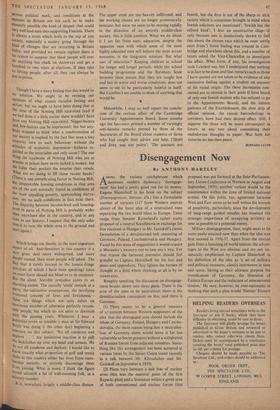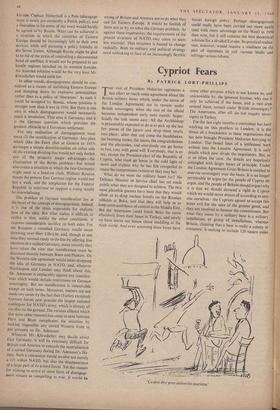Disengagement Now By ANTHONY HARTLEY A MONO the various catchphrases which
dominate modern diplomacy `disengage- ment' has had a pretty good run for its money. Eugene Hinterhoff in his book on the subject (Disengagement; Stevens, 45s.) lists a formidable number of variants. (117 from Western sources alone) of the basic idea of a neutralised zone separating the two world blocs in Europe. These range from Senator Knowland's rather scatty proposal of a neutral Scandinavia in exchange for free elections in Hungary to Mr. Gaitskell's classic formulation of a demilitarised belt consisting of Germany, Poland, Czechoslovakia and Hungary. Faced by this mass of suggestions it would require a Macaulay's memory not to lose one's way. For that reason the harassed journalist should feel grateful to Captain Hinterhoff for his lists and plans and appendices. They lighten the burden of thought in a field where thinking at all is by no means easy.
Roughly speaking, the discussion on disengage- ment breaks down into three parts. There is the area of the zone to be neutralised; there is the demilitarisation consequent on this; and there is Germany.
(1) There seems to be a general measure of aL-'eement between Western supporters of the idea that the disengaged area should include the whole of Germany, Poland, Hungary and Czecho- slovakia, the main reason being that a neutralisa- tion of Germany alone would leave it far too vulnerable to Soviet pressure without a withdrawal of Russian forces from adjacent countries. Some- thing like this arrangement has been accepted at various times by the Soviet Union (most recently in a talk between Mr. Khrushchev and Mr. Gaitskell on September 4, 1959). (2) Plans vary between a belt free of nuclear arms (this was the essential point of the first Rapacki plan) and a limitation within a given area of both conventional and nuclear forces (this proposal was put forward at the Inter-Parliamen- tary Union Conference at Warsaw in August and September, 1959); another variant would be the maintenance within the zone of limited national armies. On this point, too, agreement between West and East seems to be well within the bounds of possibility, particularly since the development of long-range guided missiles has lessened the strategic importance of occupying territory as near as possible to a potential enemy.
Military disengagement, then, might seem to be more easily attained now than when the idea was first mooted in 195q-57. Apart from the mutual gain from a lessening of world tension, the advan- tages to the West are obvious and are not un- naturally emphasised by Captain Hinterhoff in his definition of the idea as 'a set of military and political measures, closely interwoven in time and space, having as their ultimate purpose the reunification of Germany, the liberation of Eastern Europe and the reduction of international tension,' He may. however, be over-optimistic in thinking that such a plan would 'liberate' Eastern Europe. Captain Hinterhoff is a Pole (disengage- ment is surely pre-eminently a Polish policy), and a liberation in his sense of the word would hardly be agreed to Russia. What can be achieved is a situation in which the countries of Eastern Europe should be increasingly left to their own devices, while still pursuing a policy. friendly to the Soviet Union. Although Russia might be glad to be rid of the strain of controlling a discontented band of satellites, it would not be prepared to see hostile regimes installed on its western frontier. An Austrian solution would be the very least Mr. Khrushchev would settle for.
In other words, disengagement should be con- sidered as a means of stabilising Eastern Europe and damping down its explosive potentialitid rather than as a policy of 'liberation.' As such it Could be accepted by Russia, whose position is stronger now than it was in 1956. But there is one area in which disengagement would necessarily mean a revolution. That area is Germany, and it is the German question which provides the greatest obstacle to a European settlement.
For any realisation of disengagement must mean (3) the reunification of Germany. Any plan which (like the Eden plan at Geneva in 1955) envisages a simple demilitarisation on either side of the existing dividing line would not only forfeit one of the project's major advantages—the elimination of the Berlin problem—but would also create a situation in which the two Germanys might meet in a head-on clash. Without Russian troops the present East German regime would not last a week, and the temptation for the Federal Republic to intervene to support a rising would he overwhelming.
The problem of German reunification lies at the heart of the concept of disengagement. Indeed, it is one of the main arguments for explora- tion of the idea. But what makes it difficult to realise is that, unlike the other conditions, it requires considerable sacrifice on both sides. For the Russians a reunified Germany would mean throwing over Herr Ulbricht, and, though at one time they seemed ready to do this by offering free elections in a unified Germany, more recently they have taken the view that reunification must be discussed directly between Bonn and Pankow. On the Western side agreement would mean dropping the idea of Germany in NATO, and, whatever Washington and London may think about this, Dr. Adenauer is implacably against any reunifica- , lion which would include restrictions on German sovereignty. But no reunification is conceivable except on such terms. Moreover, matters are not made any easier by the fact that (Turkey excepted) German forces now provide the largest national contingent for NATO's army, which is already all too thin on the ground. The curious alliance which (for quite other reasons) has come to exist between Paris and Bonn complicates the situation by making impossible any united Western front to put pressure on Dr. Adenauer.
Whatever Mr. Khrushchev may decide about East Germany, it will be extremely difficult for Britain and America to concede the neutralisation of a united Germany during Dr. Adenauer's life- time. Such a concession would involve not merely a rift within NATO, but also the disappearance of a large part of its armed forces. Yet the reasons for ‘N ishing to arrive at some form of disengage- ment remain as compelling as ever. It would be wrong of Britain and America not to do what they can for Eastern Europe. It would be foolish of them not to try to solve the German problem. As against these imperatives, the requirements of the present structure of NATO, may come to seem less essential. That structure is bound to change radically. Both its military and political strategy need rethinking in face of an increasingly flexible Soviet foreign policy. Perhaps disengagement could really have been carried out more easily (and with more advantage to the West) in 1956 than now, but it still remains the best theoretical solution for a-divided Europe. Its practical realisa- tion, however, would require a readiness on the part of- statesmen to _call various bluffs and infringe various taboos.



































 Previous page
Previous page